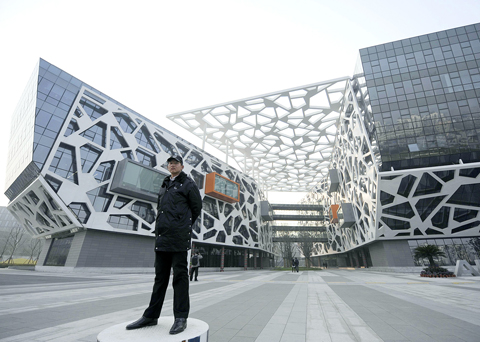China’s e-commerce giant Alibaba (阿里巴巴) yesterday condemned as “reckless” its partner Yahoo’s support of Google, which has threatened to pull out of the Asian nation over censorship and cyber attacks.
“Alibaba Group has communicated to Yahoo that Yahoo’s statement that it is ‘aligned’ with the position Google took last week was reckless given the lack of facts in evidence,” the firm’s spokesman John Spelich said in an e-mail.
“Alibaba doesn’t share this view,” he said.

PHOTO: REUTERS
Google announced on Tuesday that it would no longer censor search engine results in China and possibly leave the world’s largest online market, complaining about cyber attacks and censorship by the Chinese Communist Party regime.
China-based cyber spies struck the Internet giant and reportedly more than 30 other firms in an apparent bid for computer source codes, intellectual property and information about human rights activists around the world.
A spokeswoman for Yahoo, which owns 39 percent of Alibaba, on Wednesday welcomed Google’s decision.
“Yahoo is committed to protecting human rights and takes our users’ privacy and security very seriously,” the spokeswoman said.
“We condemn any attempts to infiltrate company networks to obtain user information,” he said.
“We stand aligned with Google that these kinds of attacks are deeply disturbing and strongly believe that the violation of user privacy is something that we as Internet pioneers must all oppose,” she said.
Alibaba controls Yahoo’s operations in China and also runs the nation’s top online auction site Taobao.com and business-to-business e-commerce platform Alibaba.com.
Chinese authorities regularly block content and Web sites they deem politically objectionable in a vast censorship system in a country with over 380 million online users.
Social networking site Facebook, Google’s video-sharing system YouTube and micro-blogging Web site Twitter are also blocked.

MORE VISITORS: The Tourism Administration said that it is seeing positive prospects in its efforts to expand the tourism market in North America and Europe Taiwan has been ranked as the cheapest place in the world to travel to this year, based on a list recommended by NerdWallet. The San Francisco-based personal finance company said that Taiwan topped the list of 16 nations it chose for budget travelers because US tourists do not need visas and travelers can easily have a good meal for less than US$10. A bus ride in Taipei costs just under US$0.50, while subway rides start at US$0.60, the firm said, adding that public transportation in Taiwan is easy to navigate. The firm also called Taiwan a “food lover’s paradise,” citing inexpensive breakfast stalls

TRADE: A mandatory declaration of origin for manufactured goods bound for the US is to take effect on May 7 to block China from exploiting Taiwan’s trade channels All products manufactured in Taiwan and exported to the US must include a signed declaration of origin starting on May 7, the Bureau of Foreign Trade announced yesterday. US President Donald Trump on April 2 imposed a 32 percent tariff on imports from Taiwan, but one week later announced a 90-day pause on its implementation. However, a universal 10 percent tariff was immediately applied to most imports from around the world. On April 12, the Trump administration further exempted computers, smartphones and semiconductors from the new tariffs. In response, President William Lai’s (賴清德) administration has introduced a series of countermeasures to support affected

CROSS-STRAIT: The vast majority of Taiwanese support maintaining the ‘status quo,’ while concern is rising about Beijing’s influence operations More than eight out of 10 Taiwanese reject Beijing’s “one country, two systems” framework for cross-strait relations, according to a survey released by the Mainland Affairs Council (MAC) on Thursday. The MAC’s latest quarterly survey found that 84.4 percent of respondents opposed Beijing’s “one country, two systems” formula for handling cross-strait relations — a figure consistent with past polling. Over the past three years, opposition to the framework has remained high, ranging from a low of 83.6 percent in April 2023 to a peak of 89.6 percent in April last year. In the most recent poll, 82.5 percent also rejected China’s

PLUGGING HOLES: The amendments would bring the legislation in line with systems found in other countries such as Japan and the US, Legislator Chen Kuan-ting said Democratic Progressive Party (DPP) Legislator Chen Kuan-ting (陳冠廷) has proposed amending national security legislation amid a spate of espionage cases. Potential gaps in security vetting procedures for personnel with access to sensitive information prompted him to propose the amendments, which would introduce changes to Article 14 of the Classified National Security Information Protection Act (國家機密保護法), Chen said yesterday. The proposal, which aims to enhance interagency vetting procedures and reduce the risk of classified information leaks, would establish a comprehensive security clearance system in Taiwan, he said. The amendment would require character and loyalty checks for civil servants and intelligence personnel prior to